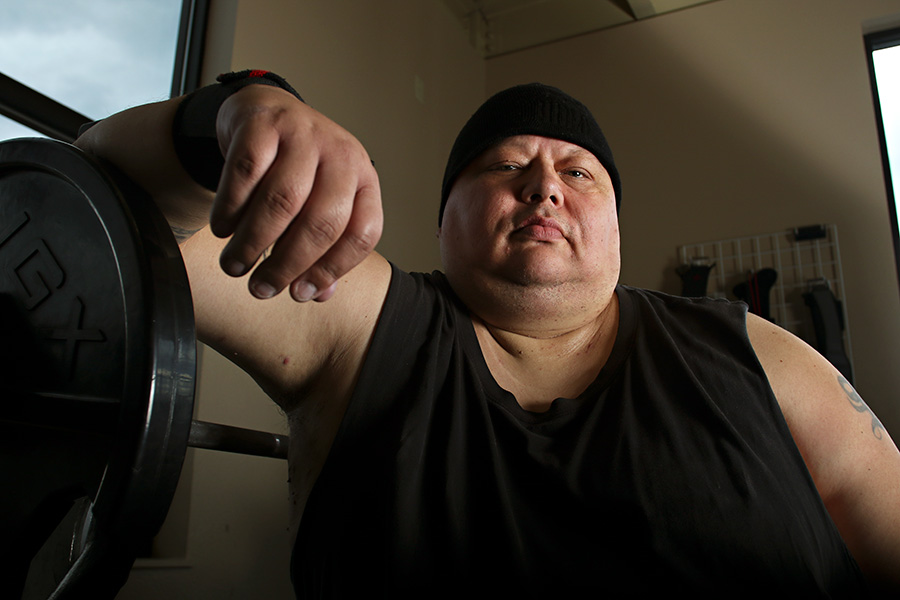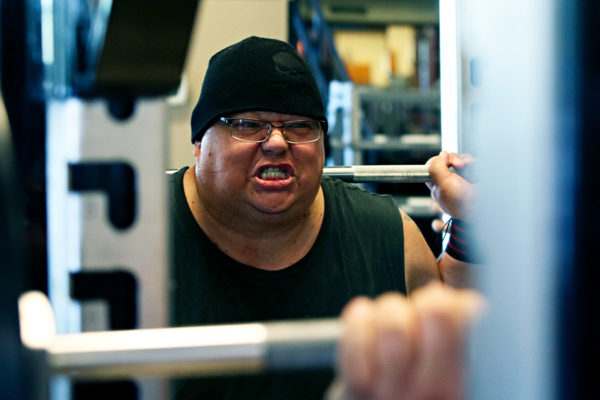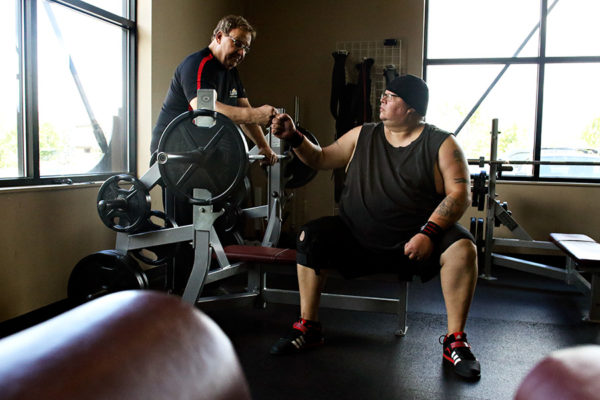Special Power
Columbia Falls weightlifter Sylvester Vermillion is a father, a survivor and a champion — and he’ll make his debut on the national stage at next month’s Special Olympics USA Games
By Andy Viano
Icelandic powerlifter Jon Pall Sigmarsson is shirtless and grunting, his two massive hands gripping a giant axel with monstrous wagon wheels on each end during a televised a strongman competition in the late 1980s. His face flushing red with effort, he takes one more rhythmic breath, straightens his arms and back, then slowly brings his legs to life to raise the enormous weight a few inches into the air.
The instant he snaps into a fully upright posture, successfully completing the maneuver, he stares into a camera trained tightly on his straining face and, with surprising clarity for a man holding up 1,005 pounds, says in English, “There is no reason to be alive if you can’t do deadlift.”
The line, if taken literally, is patently absurd. But in the years since it was first uttered, the phrase has entered the powerlifting lexicon as a motivational rallying cry. Sigmarsson, a well-known World’s Strongest Man champion, died in 1993, but this line is among his most lasting legacies.
And it’s likely that being able to deadlift was in fact Sigmarsson’s raison d’etre. Being a World’s Strongest Man was his special power, the thing that made him confident, that gave him a purpose. It is, perhaps for Sigmarsson and definitely for others who have heeded and repeated those words, the thing that every human seeks: an identity. The deadlift is a roadmap — not the only one, certainly, but a map nonetheless — to help navigate a world littered with roadblocks.
Sylvester Vermillion grew up in Joliet, Illinois, a blue-collar town about an hour southwest of Chicago. He played sports, like most kids in his neighborhood, and had what might have looked, from the outside, like a fairly ordinary childhood.
Vermillion played football and basketball, wrestled and completed in track, but it was a struggle to keep up with other students. Vermillion is autistic and suffers from what he says is “severe anxiety, severe depression and PTSD (Post-Traumatic Stress Disorder),” the result of an incident involving him and his sister when he was 5 years old. So in the sixth grade, Vermillion decided he would sign up for his school’s Special Olympics team, a program created specifically to empower athletes with intellectual disabilities.
“This is hard to say but I’ll say it anyway,” Vermillion said with considerable poise in an interview last week. “My father kind of made fun of me for doing (Special Olympics).”
As quickly as it had started, Vermillion’s Special Olympics experience was over.
Decades later, Vermillion and his then-wife moved to Montana with two kids, Sylvester (now 15) and Lakotah (14), who enrolled in school in Columbia Falls. Both teenagers participate in Special Olympics at their school, and it was a Special Olympics basketball coach who first introduced the elder Vermillion to an adult team, the Kalispell Krushers, around five years ago.
Vermillion, now 44 years old, is 6-foot-4 and 445 pounds, with expansive shoulders and tree-trunk limbs, and before he moved to Montana he worked as a furniture deliveryman in Chicago, carrying couches, beds, chairs, dressers and more up narrow flights of stairs. He later worked in a furniture warehouse, “picking up 100-, 150-pound boxes with recliners in them and stacking them.”
Despite that, when the Krushers’ coaches suggested that he give powerlifting a try, Vermillion resisted.
“I’ve seen powerlifting before and I was like, ‘I don’t think I’m that strong,’” he said.
Then he gave it a try.
“I think first off they had me squat, and I squatted like 250 (pounds) and it was nothing,” Vermillion said. “So they kept going up in weight until they bumped it up to like 375 and they were like, ‘OK, you’re squatting 375,’ and I was like, ‘Is that good?’”

At the 2018 Montana Special Olympics State Games, Vermillion squatted 405 pounds. He also bench-pressed 230 and deadlifted 430, winning each individual event and, with a collective 1,065 pounds, the combined powerlifting title as well.
Winning, for Vermillion, is nothing new, especially since he left the Krushers for the Whitefish Thunder, another local Special Olympics team, after the 2014 state games. In Montana, dozens of local adult teams have popped up to give athletes an opportunity to continue their careers once they graduate from high school.
The Thunder were born in 2010 when Kyler Morrison, then a member of the Kalispell Krushers, decided he wanted a team a little bit closer to home so he went to the Whitefish Rotary Club and made a presentation, advocating for the Rotarians to help finance a hometown team. The club’s members delivered, making the first of a now-annual $1,000 contribution toward paying the Thunder’s expenses, which run annually around $10,000 and are completely financed through donations and special events like the annual Penguin Plunge during Whitefish Winter Carnival, a Chevy truck raffle and the Special Olympics Law Enforcement Torch Run.
Kent Morrison, the Thunder’s local program coordinator and Kyler’s dad, followed his son’s lead and now oversees the team, whose mission extends well beyond athletics.
“Once (these athletes) leave the high school environment, their social structure kind of gets lost; athletes become isolated,” Kent said. “Special Olympics creates social relationships … and it helps them to work together as a team, learn how to support one another, how to be more concerned about others than themselves.”
When Vermillion left the Krushers for the Whitefish team, it wasn’t over any of the typical reasons elite athletes seek free agency. Vermillion had met Mark Kuhr, a coach with the Thunder and a former bodybuilder and powerlifter, and saw a mentor. Vermillion had been basically training himself in Kalispell, lifting so much weight that the team’s coaches weren’t able to spot for him any longer without risking injury.
So Kuhr brought Vermillion under his wing, and the two formed a nearly unstoppable powerlifting team. Vermillion has added about 170 pounds to his combined total since joining Kuhr, and earlier this year the pupil made history, becoming one of two powerlifters from Montana to qualify for the quadrennial Special Olympics USA Games, July 1-6 in Seattle. There, Kuhr and Vermillion will target 1,300 combined pounds, and the former furniture mover will take the stage at a performance hall on the University of Washington campus as his effort is broadcast live around the world on ESPN.
“It will be a really big, eye-opening event, something that they’ll be able to bring back,” Kuhr said.
Vermillion has set his children up with a babysitter who will make sure they tune into ESPN to see their dad during the Opening Ceremonies, which will also be broadcast live online. (A complete schedule of events is available at www.specialolympicsusagames.org.) Actor Taye Diggs will emcee the star-studded event, which will feature house music from Marshmello and be attended by members of the Seattle Seahawks, Sounders and other professional athletes.

Vermillion will be in Seattle to win. He is an athlete, after all, and a competitor. He’s been working several days a week to be the best possible powerlifter he can be, and the result has been year after year of wins at area and state competitions throughout Montana. And just about every time Vermillion wins, there’s the same competitor, a Great Falls man they call Big Mike, who finishes in second place.
But at the 2016 State Games in Missoula, Vermillion was disqualified on two of his three bench press reps after, Kuhr explained, an inexperienced judge waited too long at the bottom of the press to call for Vermillion to push the bar back up. Kuhr appealed the judge’s ruling, and, to Vermillion’s surprise, when the winner was announced, he claimed his usual spot atop the podium.
“(Mike) was the better lifter that day but somehow I got the gold medal,” Vermillion said. “I walked up to him and he was like, ‘Congratulations.’ He was nice. He’s the nicest (guy) … He can take second place and it doesn’t bother him. Winning a gold to me is something I know that I can do, but making somebody happier is better.”
So Vermillion walked up to Big Mike, told him “you deserve this” and handed over his gold medal. It’s a moment Big Mike reminds his chief rival of to this day when they see each other.
“He was just so happy,” Vermillion said. “He was like, ‘Really, you’re giving me your gold medal?’”
The act of sportsmanship is not unique to the Special Olympics, but it is more common there and very much in line with the lessons the games aim to teach the competitors.
“It is all about developing the individual so they can become the best that they can be, not only in athletics but also in the community, and give them confidence in their own right,” Kuhr said.
Vermillion said finding a place to go and a person to talk to has been as valuable to him as any lesson he’s learned in the weight room or gold medal he’s won.
“When I first joined (the Thunder), Mark would sit with me after practices and talk with me,” Vermillion said. “If I have a problem or an off day, we can sit and talk, and I can go from having a bad day turn into the best day in the world just by having that coach sit there and talk to me. I can pick up the phone anytime and call him.”
The lessons, and friendships, Vermillion has gained from his coaches and teammates have boosted him in his own house, too. Vermillion said he’s a more confident parent because of the success he’s had as a powerlifter, and he even said his daughter wants to take up powerlifting next year.
It is a remarkable turn, years in the making, from the anxious boy who was mocked for his disabilities inside his own home.
And as he stands to say goodbye at the end of his interview, Vermillion walks around the table to shake hands and reveals the underside of his massive forearm. This, he says, is his gift to himself. It is a black tattoo, elegantly scripted, that he shows off with a wide smile.
It reads, paraphrasing a well-known line, “There is no reason to be alive unless you can deadlift.”